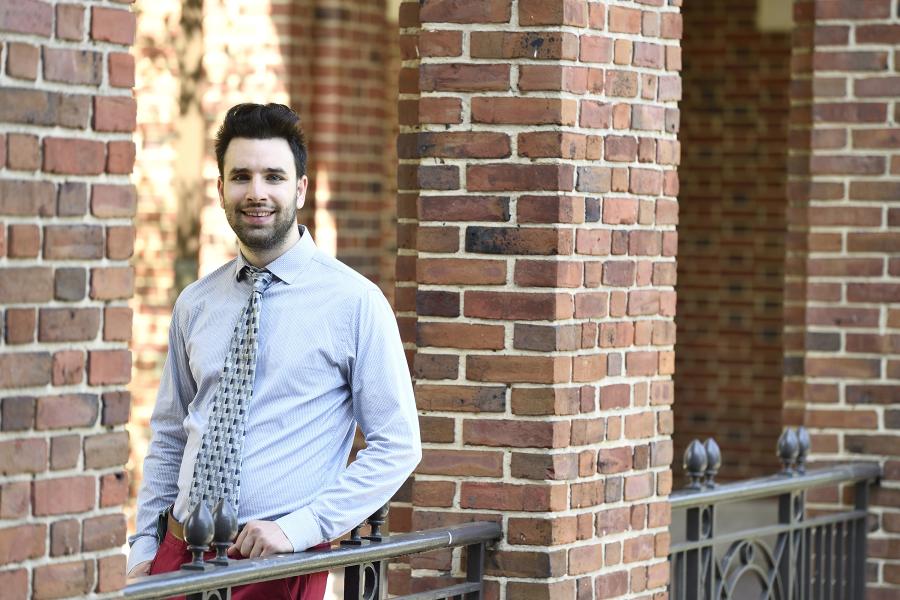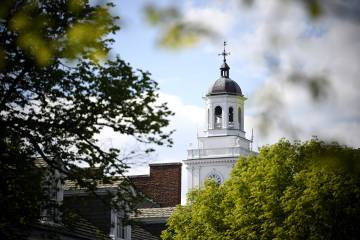During his second year as a graduate student in Johns Hopkins University's Department of History, Gregory Smaldone offhandedly told a middle school teacher friend to call him if he ever needed a guest lecture on the Haitian Revolution. When the unexpected call actually came, Smaldone added some readings to the list he was using for his comprehensive exams, put a lesson together, and headed up to Jackson Heights, New York.
The day was a big success. And it gave Smaldone an idea: Since he'd already created the materials and the lesson plan, why not do it again for a different school? And why couldn't other grad students do it too?
"It was an overwhelmingly fulfilling experience that clearly made such an impact," Smaldone says. "And all it required of me was to develop expertise in an area I'm supposed to be an expert in anyway—just a little bit quicker—and then to develop that expertise to the level where I can explain it to middle schoolers."
Building on that experience, Smaldone recruited about 10 science and humanities grad students who began offering guest lectures at Baltimore Polytechnic Institute, a citywide magnet high school known as Poly, in fall 2019. The program was cut short by the COVID-19 pandemic, but Smaldone—who completed his PhD in May 2023—held onto the spark. When he learned about the Krieger School's Society of Fellows program, he saw an opportunity to reignite it.
This is the second year for the Society of Fellows program, which was created as a new and distinctive form of community for PhD and MFA recipients in the humanities. Combining research with hands-on experience across a range of meaningful careers, fellows spend the year building on their graduate training while exploring new avenues for their academic expertise. They receive a salary, research budget, and health insurance.
Smaldone successfully applied to the program to work with Hopkins' Center for Teaching Excellence and Innovation on a project called "Students Teaching Students," which will offer coordination, training, and support for PhD candidates to teach guest lessons in K-12 classrooms in Baltimore starting this fall. Smaldone is one of four new fellows joining nine fellows returning from last year; additional fellows for 2023-24 are:
Daniel McClurkin, Department of English. McClurkin will develop his curatorial skills by working with the collections in the John Work Garret Library within the Sheridan Libraries' Virginia Fox Stern Center. He plans to write a complete bibliography of the Tudor & Stuart Club collection, translate that work into a public-facing website, and compose a series of short, scholarly essays highlighting items of interest within the collection to be published on the website. He also plans to assist in the revitalization of the Tudor & Stuart Club, which served as the nexus of Early Modern studies at Johns Hopkins for much of the 20th century, producing critical bibliographies, hosting lectures, founding the journal English Literary History, and serving as a general meeting place for students and faculty to discuss materials held in Special Collections and the field of Early Modern studies as a whole.
Michael Chapin, Department of Near Eastern Studies. Chapin plans to fully catalog the Johns Hopkins Archaeological Museum's Mesopotamian material and produce a research guide, a physical exhibit for the museum, and a virtual exhibit for the museum website. The field of Near Eastern studies is inextricably tied to legacies of colonialism and exploitation, so part of his work will involve ethically sharing the material: Chapin will coordinate with ongoing work in the museum to contextualize its objects' modern histories.
Christopher Higgins, Department of Political Science. Higgins will write a regular series titled "D.C.'s Gay Underground," on parts of the local LGBT community that don't often make headlines but are crucial parts of the social fabric, for The Blade, a Washington, D.C., gay newspaper. Exploring journalism as a more approachable, public-friendly format than academic writing, Higgins plans to produce feature articles that dive beneath the surface of the news.
Smaldone designed his teaching project with several outcomes in mind. Graduate students interested in teaching, whether at the university or K-12 level, have few opportunities to learn to develop lesson plans, which Smaldone maintains are essential no matter the students' age. "When you're not prepared at the college level, there's just as much loss of learning as when you're unprepared at the kindergarten level; it's just that it's less visible," he says.
There's also a lot of value in developing the kind of mastery of a subject that allows you to explain it to someone as far outside its context and jargon as a middle schooler, Smaldone adds.
From the schools' perspective, a well-trained guest lecturer gives students a new window into a subject or even a glimpse of a whole new topic, and offers teachers a breather to plan additional material, he says. And working with Josh Headley, Poly's Advanced Placement capstone coordinator, Smaldone plans to take the project a step further by offering grad students' support and guidance to Poly students enrolled in the school's research seminars.
"I am excited that our students will have this kind of access to top-level graduate students," Headley says. "The wealth of knowledge that is made more accessible extends beyond the specific academic content of a course and a guest lecture. JHU scholars will be able to advise and shape the best practices of student researchers as they are learning the academic research process from the beginning."
Smaldone is well-versed in the power of the classroom. Not only was he raised in a family of educators, but in second grade he delved so deeply into a project on the American Revolution that his teacher, Ms. Weinstein, gave him a New Jersey state quarter depicting George Washington crossing the Delaware River, advising him that the coin was not to spend but to commemorate a job well done.
"That is the moment that I trace back my trajectory as a historian to," says Smaldone, who still has the quarter. And when he defended his thesis in May, Ms. Weinstein joined in over Zoom.
Posted in Arts+Culture, Student Life
Tagged fellowships, humanities, graduate students









